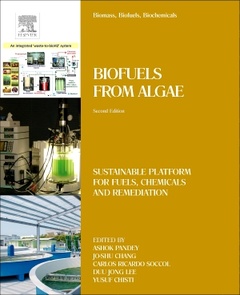Description
Biomass, Biofuels, Biochemicals (2nd Ed.)
Biofuels from Algae
Biomass, Biofuels, Biochemicals Series
Coordinators: Pandey Ashok, Lee Duu Jong, Chang Jo-Shu, Chisti Yusuf, Soccol Carlos Ricardo
Language: English
Subject for Biomass, Biofuels, Biochemicals:
Keywords
Algae; Algae biomass; Algae harvesting; Algae-bacteria consortium; Algal; Alternative aviation fuel; Biodiesel; Bioenergy; Bioethanol; Biofuel; Biofuels; Biogas; Biohydrogen; Biojet fuel; Biomass; Biomass gasification; Biomass harvesting; Bio-oil; Biophotolysis; Bioplastics; Biorefinery; Bioremediation; Botryococcus; Carbohydrates; Carbon dioxide fixation; Carbon market; Carotenoids; Chlorella; Closed-loop production; CO2; CO2 sequestering; Commercialization; Contamination; Co-products; Cosmeceuticals; Costs analysis; Cyanobacteria; Dewatering; Drying; Dunaliella; Economic; Electricity; Electrocoagulation; Electroflocculation; Electroflotation; Electrolytic flocculation; Ethanol; FAME; Feed; Fertilizer; Flocculants; Flocculation; Flocculation-sedimentation; Food; Fuel property specifications; Functional foods; Gasification; Guidelines; Haematococcus; Harvesting; Heterotrophic; Heterotrophic growth; Hydrogen; Hydrothermal liquefaction; Hydrothermal upgradation; Hydrotreatment; Isolation; Life Cycle Assessment (LCA); Lipid droplet; Lipids; Liquefaction; Liquid biofuels; Metabolic engineering; microalgae; Microalgae; Microalgal bio-oil; Microalgal biorefineries; Microalgal cultivation; Mixotrophic; Natural pigment; Nitrogen; Nutrient recycling; Nutrient removal; Nutrients; Nutrients recycling; Nutritional supplement; Oleaginous; Open ponds; open reactors; Open reactors design; Phosphorus; Photoautotrophic cultivation; Photobioreactor; Photobioreactors design; Photosynthesis; Phycobiliproteins; Polysaccharides; Polyunsaturated fatty acids; Process parameter; production cost; PUFAs; Pyrolysis; Recycle; Renewable energy; Review; Screening; Separation; Spirulina; Starch; Sugarcane vinasse; Thickening; Triacylglycerol; Triacylglycerols (TAG); Value-added chemicals; Wastewater; Wastewater treatment
603 p. · 19x23.3 cm · Paperback
Description
/li>Contents
/li>Readership
/li>Biography
/li>Comment
/li>
Biomass, Biofuels and Biochemicals: Biofuels from Algae, Second Edition provides information on strategies for commercial microalgae based biofuel production, including their cultivation, pre-treatment and conversion methods. The book discusses methods for producing microalgal biomass in large scale by outdoor culturing and outlines new technologies for their use. In addition, it explains how modern genetic engineering enables the generation of recombinant strains that generate higher quantities of feedstock. The complete utilization of microalgal biomass, which can also be obtained from valorizing nutrients from wastewater and industrial exhaust gases, can be efficiently converted to energy rich biofuels and high value pharmaceuticals in a well-defined biorefinery.
1. Introduction to algal fuels2. Culture media for mass production of microalgae3. Microalgal strain selection for biofuel production4. Algal biomass harvesting5. Algal culture and biofuel production using wastewater6. Metabolic engineering and molecular biotechnology of microalgae for fuel production7. Open pond systems for microalgal culture8. Design of photobioreactors for algal culture9. Heterotrophic production of algal oils10. Flocculation and electroflocculation for algal biomass recovery11. Algal oils as fuels12. Production of biohydrogen from microalgae13. Production of potential co-products from microalgae14. Applications of spent algal biomass15. Hydrothermal upgradation of algae into value-added hydrocarbons16. Scale-up and commercialization of algal cultivation and biofuel production17. Life-cycle assessment of microalgal biofuels18. Economics of microalgae biomass production
post-graduates students and researchers in chemical engineering, chemistry, biotechnology, biology working in the wider area of the bio-mass to bio-energy conversion. This book is a key reference text for R&D managers in industry interested in the development of bioenergy technologies
Professor Pandey is Adjunct/Visiting Professor/Scientist in universities in France, Brazil, Canada, China, Korea, South Africa, and Switzerland and also in several universities several in India. He has ~1425 publications/communications, which include 16 patents, 90 books, >700 papers and book chapters, etc with h index of 105 and ~48,800 citations (Goggle scholar). He has transferred several technologies to industries and has done industrial consultancy for about a dozen projects for Indian/international industries.
Professor Pandey is the recipient of many national and international awards and honours, which include Highest Cited Researcher (Top 1% in the world), Clarivate Analytics, Web of Science (2020, 2019 & 2018); Top scientist in Biotechnology (#1 in India and #8 in the world), Stanford University world ranking (2020); Fellow, World Society of Sustainable Energy Technologies?(2020); Fellow, Indian Chemical Society (2020); Distinguished Scientist, VDGOOD Professional Association, India (2020); Distinguished Professor of Eminence with global impact in the area of Biotechnology, Precious Cornerstone University, Nigeria (2020); IconSWM Life-time Achievement Award 2019, Internatio
- Includes the current technologies for the cultivation and conversion of energy rich microalgal biomass into biofuels
- Provides information on all the conversion methods – biochemical and thermochemical conversions
- Covers other high value products from microalgae and less conventional applications, such as fine chemical production and aviation fuel generation
- Discusses the economics of microalgal biofuel production and how to accomplish cost competitive results
These books may interest you

Biofuels from Algae 152.01 €



